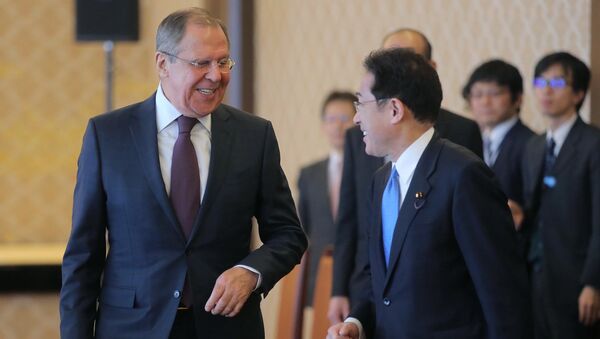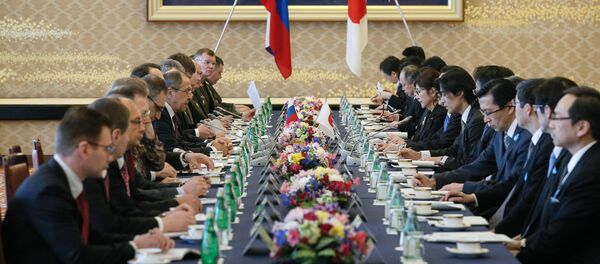On Monday, Foreign Minister Sergei Lavrov and Defense Minister Sergei Shoigu and their Japanese counterparts Fumio Kishida and Minister Tomomi Inada, held the so-called "2+2" dialogue on bilateral and regional issues amid a thaw in Russian-Japanese relations.
"Cooperation between states is necessary to adopt regulatory measures with regard to security issues. I consider it important that in this situation consultations in the '2+2' format are held at the ministerial level for the first time in the past four years," Inada said during a meeting with Sergei Shoigu.
At the same time, Tokyo is bolstering its ties with Washington. During his recent visit to Japan US Secretary of State Rex Tillerson clearly signaled that the US is interested in deepening cooperation with its longstanding Asian ally.
Speaking to Sputnik Chinese, Jiang Yuechun, director of the Chinese Institute of International Studies' Center for World Economy and Development, assumed that Tokyo's recent move shows the country wants to boost its influence in Asia-Pacific.
"Japan's foreign policy is now focused on strengthening ties with the US and developing a 'military alliance' with Washington. [On the other hand], the ‘2+2' dialogue with Russia appears to indicate that Russia and Japan intend to expand their bilateral and security cooperation. By strengthening relations with both the US and Russia on security issues, Japan hopes to acquire greater influence on the security in Asia-Pacific," Jiang told Sputnik.
"In my opinion, Japan's foreign policy is mainly aimed at bolstering cooperation with the United States," Zhang told Sputnik, "As for the dialogue with Russia in the ‘2+2' format, despite the two countries' intentions to develop economic cooperation, Japan will seek to solve its territorial issue related to the Kuril Islands."
Previously, in December 2016 Russian President Vladimir Putin and Japanese Prime Minister Shinzo Abe agreed to establish joint economic activities on the Southern Kurils in a bid to create a favorable atmosphere for talks on a peace treaty between the countries.
"Japan will cooperate with the United States in solving the problem of the Korean peninsula. By bringing this issue to the negotiating table with the Russians, Japan is trying to influence Russia's policy in order to lay the foundation for future coordination with the United States," the Chinese expert added.
"In the eyes of Japan, the alliance with the US guarantees the country's security in confronting the so-called threat allegedly posed by China; it also allows [Tokyo] to increase its influence in the international arena," he explained in his interview with Sputnik.
"As for the DPRK [the Democratic People's Republic of Korea], the United States has ‘lost' patience in solving this problem through diplomatic means. There is a possibility that the settlement of the issue will require the use of military force," he noted, referring to Rex Tillerson's statement made during his official visits to Japan and South Korea.
"Certainly we do not want for things to get to a military conflict. But obviously if North Korea takes actions that threaten the South Korean forces or our own forces then that would be met with an appropriate response," Tillerson told journalists, as quoted by NBC News.





